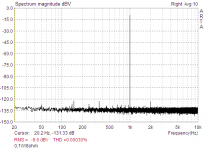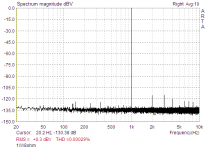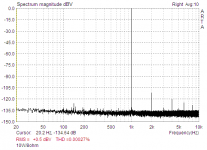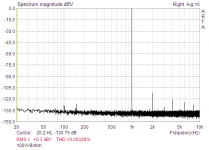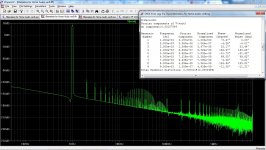I love to measure, it's just that what I measure with THD is not giving me enough REAL information to make better products, that I am sure are still possible. I, too, can measure down to -140dB, so what? I am very disappointed after my investment in the test equipment that I get so little to work with.
Absolutely true, and it is a pity that so far we have no method of measuring amplifier, that would correlate with listening experience. Moreover, I almost lost hope that this method will appear during our lifetime. My usual practice is to regularly clean the contacts of connectors being in the signal chain, as soon as I start to notice a change in the sound (slight loss of vocal emotions). After contacts wiping, the emotions are restored. It creates a reason for sadness: what signal measurements can monitor the status of the contact surfaces coated with gold or rhodium?
And, of course, action of GNFB is recognizable, even with fully-class-A SE solid-state amp. However, I guess, this is not a reason that all buyers of audio equipment would give definite preferance to that or another amp. Discussing of the GNFB artefacts is more a subject for some "aficionados". After all, now I listen to GM70 SE tube amp, and it can serve as a reference for recognizing GNFB artefacts.
Last edited:
I think JC is once again playing with us as he knows full well what the additional tests are that can and should be done...
I think JC is once again playing with us as he knows full well what the additional tests are that can and should be done...
... especially since he owns IIRC an SR-1. I have however not seen ANY measurements from him with this super duper equipment.
Dust it off JC, and do something with it. Explore for instance multi-tone measurements! 😉
Jan
One overall comment I'd like to make is that 'listening tests' are measurements, and that they can have just as much validity as mechanical and technical measurements, if they're done properly.
My complaint is that listening tests are tedious and error prone, and fail to result in a 'better - worse' ranking in the way that numeric tests can do. So, they're difficult to perform, and they don't help out when one is trying to incrementally optimize a design.
Still, yes, at the end of the day, a listening test is the ultimate arbiter, but they're so hard to do without falling victim to bias and preconception. Further, numeric tests won't always show what 'sounds better', but they can be used to get a better insight into how a circuit works, which parameters matter and which don't, and whether the results of willful effort actually effected a physically noticeable change in the circuit.
Obviously, a combination of both types of tests are needed, but again, my point is that a good listening test really is a measurement, just as valid and reliable as a technical measurement. And, the errors and uncertainty of both types of measurements need to be considered in order to draw any valid conclusions. Sloppy technical measurements are just as invalid as sloppily conducted listening tests, and only a fool follows either blindly.
My complaint is that listening tests are tedious and error prone, and fail to result in a 'better - worse' ranking in the way that numeric tests can do. So, they're difficult to perform, and they don't help out when one is trying to incrementally optimize a design.
Still, yes, at the end of the day, a listening test is the ultimate arbiter, but they're so hard to do without falling victim to bias and preconception. Further, numeric tests won't always show what 'sounds better', but they can be used to get a better insight into how a circuit works, which parameters matter and which don't, and whether the results of willful effort actually effected a physically noticeable change in the circuit.
Obviously, a combination of both types of tests are needed, but again, my point is that a good listening test really is a measurement, just as valid and reliable as a technical measurement. And, the errors and uncertainty of both types of measurements need to be considered in order to draw any valid conclusions. Sloppy technical measurements are just as invalid as sloppily conducted listening tests, and only a fool follows either blindly.
1. Would one say that this is a good sounding amplifier ?
2. Does this amplifier use feedback ?
3. What type of amplifier is this ?
Let me guess.... It's a simulated amplifier.
😎
- by Vladimir K in TashkentAnd, of course, action of GNFB is recognizable, even with fully-class-A SE solid-state amp. However, I guess, this is not a reason that all buyers of audio equipment would give definite preferance to that or another amp. Discussing of the GNFB artefacts is more a subject for some "aficionados". After all, now I listen to GM70 SE tube amp, and it can serve as a reference for recognizing GNFB artefacts.
Thank you very much for your worthy comments.......! 😎
Hugh
The same questions about this one? 😉
Not even close to enough information. Also, and perhaps most fundamental, no precise definition about what "good" is.
I would be very interested to know what SS/D amplifier does not produce higher ordered harmonics (5th and above)!First, the distortion needs to be audible. Not all ss/class d amps produce audible higher order distortion.
Second, what is your metric for "brightness"? Like "euphonic", "dark", "smooth", etc., it seems to be subjective. Perhaps not everyone who hears a ss amp would call it "bright". That's a matter of interpretation.
I run a recording studio so I deal with this all the time. When I play back recordings I have made on various systems I can tell if they are bright nor not right away. It is helpful to make your own recordings and then produce them so you indeed do have a metric. But just in case you are not aware of this fact, the single most often made complaint against solid state amplifiers in general is that they are bright.
Third, it would seem your argument that tubes are "best" comes down to "my distortion is better than yours"....I would rather my amp produced distortion that was inaudible.
Seems the large number of people who prefer ss or class d indicates either: there are amps that don't produce audible amounts of these higher order distortions, or not enough to matter, and/or it really isn't perceived by many to be as as bad as you make it out to be. Or maybe some combination of all of the above.
No doubt tube amps have their fan base but so do other amp topologies. I wouldn't say there is something superior about tubes either subjectively or objectively. They are just another flavor.
Text in bold: from your comment only, it seems that you are not understanding how the human ear/brain system detects sound pressure. In a nutshell the ear is more sensitive to higher ordered harmonics than most test equipment can winnow out. So there is no 'negligible amount'.
Since we as an industry have not been able to solve this problem, the inevitable result is that amplifiers have tailored distortion characteristics, taking advantage of the ear's masking principle to hide the presence of higher ordered harmonics, or in some cases simply eschewing GNFB altogether to avoid their generation (BTW, there are SS amps that fall in this category).
IOW, you can produce an amplifier with a fair amount of distortion that is less audible than if it produces very little but all of it is higher orders. And don't get me wrong here: I am not a fan of 2nd order harmonics. I'm just being pragmatic.
Really? Which harmonics and at what level cause this brightness you keep hearing? I'm interested in knowing what you consider the audibility limits of these harmonics.
Well its easy enough to hear 0.005%... the reasons why were covered earlier in this thread. As to the harmonics: the 5th and above. However, in the real world its more complex than that as IM plays a role (interpreted by the ear as brightness and graininess) as do inharmonic distortions.
Personally, I find the comments from the anti-feedback contingent requesting more focus on psycho acoustics amusing.
Is it just me, or wouldn't the simplest hypothesis (Occam's Razor) be that all of the preferences towards all amplifiers (obviously including those designed with audible distortion) be purely illusory, i.e. completely uncorrelated with any known or even yet discovered audio property?
Yes, I know I am a never ending skeptic, and I can handle the tough "why are we here question" which I can't say for most people, but I already believe people are "hearing" the look of tubes, the pricetag, the aesthetic design, or randomly equating some degradation in sound with a preference.
In a nutshell, as soon as a person thinks they know everything they are also playing the role of a fool. The simple fact is that if we can understand how we perceive sound we can engineer better equipment. Most of our engineering is based on our understanding of sound perception from 50 years ago; we've learned a lot since then but very little is applied.
In case the anti-feedback comment is aimed at me, you are mistaken in thinking that is what I am. I may sound anti-feedback to some and perhaps also anti-SS; both assumptions are quite mistaken. I want it to work is all and I see a lot of poor designs in the marketplace that seem to be accepted as excellent. Is it just that I have higher standards??
The problem is that whatever feedback does to make the sound 'artificial' is not easily measured with even the best THD equipment. We have known this for at least 30 years. You just have to LISTEN and compare.
Ah! Thank-you for this!! +1 JC and I seem to be on the same page; I have noticed that I have agreed with many of his posts. To expand on JC's comment we have known this for at least 50 years- Norman Crowhurst was writing about this in 1959.
Text in bold: (with the exception of the word 'your') this is a common conflation of personal taste vs human perceptual rules and as such is wildly inaccurate. 'Warmth' in tube amps and brightness and hardness in SS amps are both manifestations of distortion. What I find that most SS advocates seem to misunderstand is how trace amounts of higher ordered harmonics are extremely audible to the human ear (but so far when I encounter that, universally they don't understand much in the way of human hearing perceptual rules either). I don't have any trouble understanding that SS advocates don't like the warmth of tubes. They hear it (human hearing rules) and don't like it (taste).Interesting - I have always experienced good, high feedback ss amps as 'neutral , and many tube amps (often low/no) fb as 'warm' or 'colored'.
(Except a few 'engineered' amps like Bob Cordell's tube amp or Bruno's 'flight of fancy' - these were as neutral as the best ss).
I agree with you that perception is a very personal thing and can vary wildly from one guy to the next. But that also means that your perception of brightness of ss is personal and not some universal fact. Just as my perception of warmth of some tube amp is personal for me.
My reference for accuracy and transparency is a ss amp, apparently your ref is a tube amp.
None of this is earth-shattering but I find it worthwhile to 'ground' our views once in a while.
Jan
IOW the warmth of tubes is not something experienced by some and not others. Its not personal to you- I hear it too (and just FWIW, as you alluded its possible to design a tube amplifier that does not exhibit this property; I do it by avoiding the use of single-ended circuitry).
I can understand though that someone might consider a bright amplifier with low distortion and lacking warmth to be more neutral. That is an example of taste. Do you see the distinction?
I see neutral as something else- no manifestation of warmth, no manifestation of brightness either, even though its obvious that the amplifier has speed and extended bandwidth.
flat frequency response over audio then is not "neutral" in your worldview?IOW the warmth of tubes is not something experienced by some and not others. Its not personal to you- I hear it too (and just FWIW, as you alluded its possible to design a tube amplifier that does not exhibit this property; I do it by avoiding the use of single-ended circuitry).
I can understand though that someone might consider a bright amplifier with low distortion and lacking warmth to be more neutral. That is an example of taste. Do you see the distinction?
I see neutral as something else- no manifestation of warmth, no manifestation of brightness either, even though its obvious that the amplifier has speed and extended bandwidth.
can we put your ears in a vault, take them out to calibrate secondary standards every few decades?
this is a common conflation of personal taste vs human perceptual rules and as such is wildly inaccurate. 'Warmth' in tube amps and brightness and hardness in SS amps are both manifestations of distortion. What I find that most SS advocates seem to misunderstand is how trace amounts of higher ordered harmonics are extremely audible to the human ear (but so far when I encounter that, universally they don't understand much in the way of human hearing perceptual rules either). I don't have any trouble understanding that SS advocates don't like the warmth of tubes. They hear it (human hearing rules) and don't like it (taste).
show me a study indicating human listening discrimination of distortions below human perceptual noise floor in quiet with appropriate critical band frequency bandwidth - while listening to music that is north of 100 dB SPL to be creating even that ppm distortion for properly sized amp to speaker in room sensitivity
Last edited:
I would be very interested to know what SS/D amplifier does not produce higher ordered harmonics (5th and above)!
Not sure what your threshold is, but how about the attached?
Just a random example that springs to mind.
Jan
Attachments
Not sure what your threshold is, but how about the attached?
Just a random example that springs to mind.
Jan
Hi Jan
I wonder what`s hiding beyond 20Khz on that`s NC1200 from bottom three IMD charts ?
well the quoted 0.005% is -86dB from wanted. Plenty of amplifiers out there with the 5th and above well below that level as well as the 2nd 3rd and 4th!
Hi Jan
I wonder what`s hiding beyond 20Khz on that`s NC1200 from bottom three IMD charts ?
The idea is to look at the IMD product from 18 & 19 kHz that folds down to 1kHz. This is a standard test that is sensitive to distortion at the top end of the audio band.
Anyway, Ralph asked about the 5th, so I pulled up these graphs for him.
Jan
The idea is to look at the IMD product from 18 & 19 kHz that folds down to 1kHz. This is a standard test that is sensitive to distortion at the top end of the audio band.
Anyway, Ralph asked about the 5th, so I pulled up these graphs for him.
Jan
Thanks for your answer Jan !
Anyway personally I still wonder what`s hiding beyond 20Khz ?
well the quoted 0.005% is -86dB from wanted. Plenty of amplifiers out there with the 5th and above well below that level as well as the 2nd 3rd and 4th!
Well I was hoping that Ralph would proudly show his amplifier doing much better - after all, if he feels the 5th is so important I would expect his own products to do (much) better. But maybe he's just out on an errand and will report back later.
Jan
Guy`s ,
In the mid-time let`s see & hear what BHK have to say on our Amps & GNFB subject :
:
https://www.youtube.com/watch?v=toJMJ2VDMBo
In the mid-time let`s see & hear what BHK have to say on our Amps & GNFB subject
 :
: https://www.youtube.com/watch?v=toJMJ2VDMBo
let`s see & hear what BHK have to say on our Amps & GNFB subject
I see that we share the same type of soldering iron.
😎
- Home
- Amplifiers
- Solid State
- Global Feedback - A huge benefit for audio
